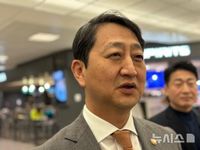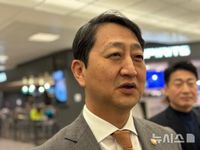On March 20, 2025, South Korea’s Industry Minister Ahn Duk-geun landed at Dulles International Airport in the U.S., gearing up for significant discussions ahead. He is set to meet with U.S. Energy Secretary Chris Wright on March 21 to request South Korea’s removal from the export control list of sensitive countries. This designation, established under the Biden administration in January 2025, is poised to go into effect on April 15, 2025, casting a shadow over South Korea’s technological collaboration with the U.S.
South Korea’s government, including Minister Ahn, insists that while the U.S. claims there are no major issues with scientific and technological cooperation, changes that could complicate research and industrial collaborations are unavoidable if the designation stays in place. Minister Ahn has emphasized the urgency of resolving this matter promptly to minimize any disruptions.
During his previous visit just three weeks ago, Ahn had already begun communication with the U.S. regarding South Korea's position. He pointed out that his department has conveyed its stance through practical channels, and this time he hopes to solidify discussions directly with Secretary Wright. This meeting isn’t just a formality; it represents a pivotal moment for bilateral scientific and industrial collaboration.
“The U.S. government's official explanation is clear that they see no relation between the designation and any domestic theories surrounding our military posture,” Minister Ahn asserted, addressing speculation that South Korea's independent nuclear program discussions may have influenced the decision.
In further consultations, Ahn seeks to explore additional support measures from the U.S., aiming to safeguard collaborative avenues in technology and research. “We’re striving to create constructive alternatives if our request to lift the designation doesn't succeed,” he stated, underlining a commitment to cooperation.
On the same day (March 21), Ahn is expected to meet with U.S. Commerce Secretary Howard Lott to address tariffs imposed by the Trump administration, set to be enacted on April 2, 2025. Given South Korea’s significant trade surplus with the U.S., the country stands to be a primary target for these reciprocal tariffs. The implications of such tariffs loom large, particularly as they risk decimating South Korean exports.
Reflecting on the recent trade discussions, Ahn shared insights into a recent visit from a trade negotiation headquarters official who engaged with the U.S. Trade Representative (USTR). He underscored that further explanations and outreach would continue in response to various non-tariff issues raised by the U.S.
U.S. Treasury Secretary Scott Besant, in a recent interview, referred to a group labeled the ‘Dirty 15,’ which could potentially include South Korea. This group's designation might result in significant tariffs being levied. Minister Ahn has clarified that while predictions on South Korea’s inclusion are inherently uncertain, he is focused on minimizing negative impacts through sustained consultations.
Ahn’s approach to the impending tariff imposition reflects a nuanced understanding of the broader economic landscape. “It seems virtually impossible to secure exemptions under the current administration’s stance towards tariffs,” he remarked, observing that measures being put into place suggest limited flexibility to adjust once firm rules are applied.
Despite this grim forecast, Ahn expressed that ongoing dialogue and trust building could play a crucial role in future negotiations regarding tariffs. He emphasized that their goal is not to reach a conclusive settlement before the April deadline, but rather to lay the groundwork for long-term cooperation and establish a framework beneficial to both parties.
The growing concerns surrounding technological security and energy cooperation also lie at the heart of these discussions. Minister Ahn highlighted opportunities for enhanced collaboration with the U.S. on energy initiatives, demonstrating a dual focus on addressing immediate trade challenges while also exploring synergistic areas for joint advancements.
Ahn concluded his remarks by reinforcing the importance of continued communication and collaborative strategies in navigating these tumultuous trade waters. As South Korea navigates these discussions with the U.S., the path forward will likely depend on maintaining a clear dialogue and an agile response to evolving trade dynamics.


